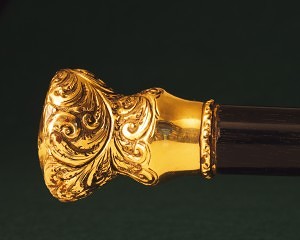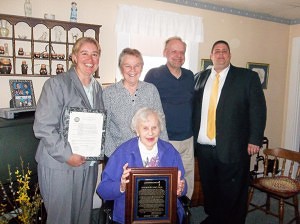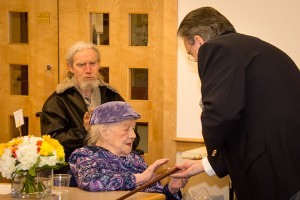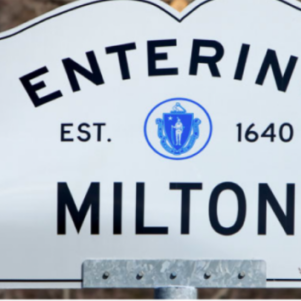Boston Post cane tradition continues today
By Beth Treffeisen | August 1, 2015, 7:33 EDT
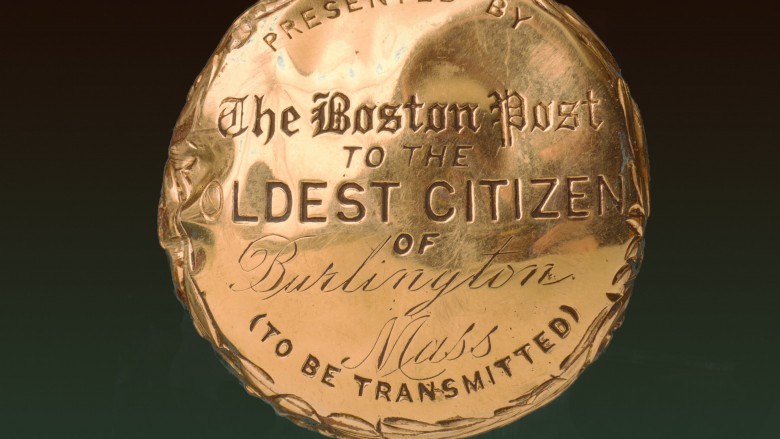
In 2001, Brian O’ Grady, the Director of the Council on Aging in Williamstown, Mass., was cleaning out a closet in the Senior Center when Hazel Burchick, one of the seniors in town, wondered out loud: ‘Whatever happened to the old cane we used to give people?’
O’Grady, many years Burchick’s junior, had no idea what Burchick meant when she asked about the “old cane.” Curious, he began his own research and discovered that the cane to which Burchick referred wasn’t just any old cane. It was a Boston Post cane — an ebony cane adorned with an engraved golden knob that, by tradition, 700 New England towns once presented to their oldest living citizens on behalf of the Boston Post, the region’s major newspaper in the early 1900s.
The Boston Post cane tradition dates back to 1909, when Edwin A. Grozier, the publisher of the Post, sent his handsome canes to the Boards of Selectmen of various towns, requesting that they present them to their oldest male citizens. According to the Maynard Historical Society, beginning in 1930, some select boards began allowing women to receive the canes.
The Boston Post folded in 1956, but the cane tradition has been kept alive by some New England towns as a way to honor elder citizens and connect citizens with local history.
In the course of his research, O’Grady learned that the Williamstown cane, which Burchick had asked about, was missing. To try to track it down, O’Grady sent out a notice to Williamstown residents, asking them to look in their attics for a cane that fit the description. On Easter Sunday 2001, O’Grady received a phone call from a local resident who had discovered the cane in her attic. Not long after, Williamstown revived the tradition of passing the cane to the oldest person in town.
It seems only fitting that the Williamstown cane eventually did belong to Hazel Burchick, the senior citizen who originally asked O’Grady about the cane’s whereabouts. The cane now is held by Marion Davis Shaw. According to O’Grady, when Burchick received the cane after years of waiting she immediately pumped it up in the air saying, “Yes, yes!”
“I think aging is an important thing to recognize,” said O’Grady. “Success in aging is great. You know what’s the alternative, right? For people to recognize people who have lived a long life is important.”
Throughout the years, some of the original Boston Post canes have been lost, stolen, sold on e-bay, or destroyed. But many towns still have the original canes in their possession. Others have replicas.
Currently, 475 towns report on continuing the tradition. “Considering it’s over a hundred years old, and it was a publicity stunt, I think it’s kind of amazing that it still continues,” said David Griffin, the President of the Maynard Historical Society. “[I]t kind of has a nice old timey feel to it.”
In Maynard, the cane was most recently presented to Mildred Duggan in March 2013. She is now 103-years-old. Duggan, who has lived in Maynard her entire life, said, through correspondence from her niece Ellen Duggan, that she clearly remembers some of the cane’s earlier owners and that she never expected to one day be the recipient of the cane herself. “Traditions of any kind are important,” said Ellen Duggan, “and this one is special.”
This past March, Burlington, Mass., discovered that its original cane, missing since a fire burned down the town hall in the late 1960s, was housed in the museum of the Historical Commission of Massachusetts. The cane has since been returned to Burlington.
Amy E. Warfield, the Burlington town clerk, noted that the Boston Post cane has provided a welcome opportunity for residents to connect with their town history and with local community.
“We are really trying to hang on to what history we have, so this is kind of a neat way we can do that,” said Warfield. “[It’s a great way to] honor the past, bring along the tradition, and bring it into the future.”
Additional reporting was done by Ann Schmidt.
Contact Beth Treffeisen at [email protected]

